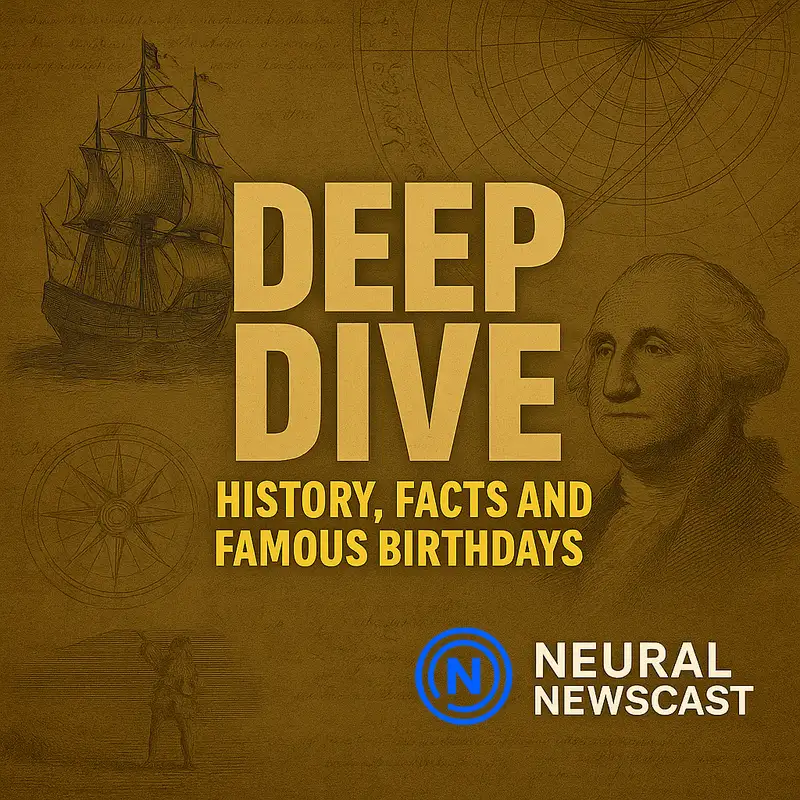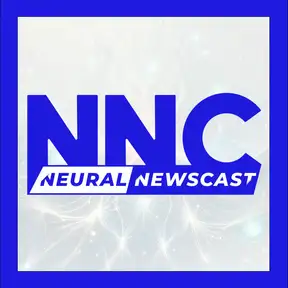Deep Dive: Concorde's Legacy and Celebrating Iconic Birthdays - June 20, 2025
From real voices to synthesized reporting, this is Neural Newscast,
where AI meets journalism.
Thanks for joining us for this Neural Newscast deep dive.
I'm Lila, and alongside Ethan, we're about to uncover some intriguing stories.
What a fascinating day in history, Ethan.
On this day in 1975, the Concorde made its maiden flight, ushering in an era where crossing
the Atlantic could be faster than ever imagined.
Can you picture the allure and excitement of that time?
Absolutely, Lila.
The Concorde was more than just a marvel of engineering.
It symbolized a bold leap into the future.
I mean, we're talking about cutting transatlantic flight time in half.
That's not just convenience.
It's transformative for global business and cultural exchanges.
Right? And from an arts perspective, the Concord was almost a muse in itself.
It represented modernity and sophistication.
Think about how many creatives must have been inspired by the sleek design
and the sheer idea of moving through the air at twice the speed of sound.
It was a flying piece of art.
True. And its impact wasn't just on the cultural sphere.
Economically, it was poised to redefine high-speed travel.
The implications for business were immense.
Executives could hop to meetings across continents and be back home for dinner.
But of course, there were the costs.
Ah, yes, the costs.
The Concord wasn't exactly accessible, was it?
I remember reading that a ticket was equivalent to the price of a small car at the time, right?
Exactly.
And that exclusivity, while glamorous, limited its market reach.
The operations, including the fuel consumption, were enormously expensive.
Plus, the sonic booms limited where it could fly over land, directly affecting its profitability.
But despite these hurdles, it maintained an aura of prestige.
Prestige, indeed.
And while it didn't reach the widespread adoption many envisioned,
it certainly left a lasting cultural legacy.
The Concord was featured in films, mentioned in songs,
and became an icon of an era that celebrated progress and elegance.
It's fascinating how it serves as a reminder of the trade-offs
between technological ambition and economic practicality.
The Concord was a technological triumph, but perhaps a bit ahead of its economic time.
Well put, it's a perfect example of how innovation can sometimes race ahead of what the broader market can bear, at least financially.
Nevertheless, its story continues to captivate our imaginations.
And who knows?
With the growing interest in supersonic travel technology, we might just see a modern-day revival.
but one that perhaps learns from the Concord's journey,
balancing speed with sustainability and cost-effectiveness.
That's a thrilling prospect, Ethan.
The Concord's legacy really does continue to inspire.
Who wouldn't want to experience the magic of crossing the Atlantic in just a few hours?
Music
Today we celebrate the birthdays of the illustrious Charles Adams, 1912,
the iconic Sylvia Plath, 1932, and the innovative Bill Gates, 1955.
Quite a lineup. Charles Adams, the mind behind the Adams family?
His macabre humor was groundbreaking for its time, wasn't it?
Absolutely.
Adams had this remarkable way of blending the macabre with humor,
creating a world where the eerie felt oddly charming.
His cartoons for the New Yorker captured the quirks of family life through such a unique lens.
Did you know his characters weren't named until they were adapted for television in the 1960s?
Right, Gomez and Morticia, all those characters gained names from the show.
And it's fascinating how something that started on a printed page still resonates with audiences
today, especially given the show's recent adaptations.
Exactly. His work continues to tap into a certain nostalgia that's surprisingly fresh.
It's like it never really ages.
But let's pivot to Sylvia Plath, whose influence on literature is profound,
yet she had such a tragically brief career.
Plath's poetry and prose have this enduring resonance, especially the bell jar.
Her exploration of personal identity and mental health issues was truly ahead of its time.
Indeed, Ethan. Her writing exudes this raw, visceral energy, and despite her tragic end,
her voice remains so powerful, almost as if she's still speaking to the struggles of modern times.
The way she articulated such personal pain speaks volumes about her talent.
Her work really does tap into something universal, doesn't it?
Now, talking of universal impact, Bill Gates, born in 1955, certainly shifted global paradigms in technology and philanthropy.
His contributions go beyond just Microsoft.
Gates reshaped how we live and work.
The foundation of Microsoft was such a pivotal moment in tech history, revolutionizing personal computing.
And then there's his immense philanthropic effort.
It's quite something, the scale at which he's committed to tackling global issues.
Definitely.
The Bill and Melinda Gates Foundation is a testament to leveraging success for global
good.
His shift from software to seeking solutions for problems like infectious diseases and
education inequalities, it's quite remarkable.
Gates exemplifies how technological innovation can be a force for good, integrating economic foresight with humanitarian goals.
His legacy is one of transformation and generosity, revealing that wealth can indeed drive positive change.
His story is a powerful reminder of how vision and ambition, coupled with responsibility, can leave an indelible mark on the world.
Each of these figures, in their own ways, illustrates that true impact extends far beyond their original fields.
Time for a quick pause. We'll explore more when Neural Newscast Deep Dive returns.
From breaking news to developing stories, you're listening to NNC, Neural Newscast, fast, factual and thoughtfully reviewed.
Visit neuralnewscast.com for past episodes and all our shows.
Thanks for staying with us on Neural Newscast's deep dive.
Let's get back to our discussion.
Did you know that the newsletter Now I Know, which has been sharing fascinating facts daily,
just celebrated its 15th anniversary?
It's quite impressive for a digital publication to maintain such a dedicated following over that time.
Absolutely, Leigh.
Sustaining reader interest for 15 years is no small feat in the fast-paced digital era,
where content is often ephemeral.
Achieving longevity like that is remarkable.
From a business perspective, it speaks volumes about how they've adapted and grown.
Right, Ethan.
What fascinates me is how Now I Know consistently captures those quirky, often overlooked stories.
It's like a cultural time capsule, don't you think?
Each fact is a little window into the world's eccentricities.
Definitely. And there's a financial angle here too.
I imagine their success also hinges on a strong understanding of audience engagement.
They've likely curated a model that combines both free and premium content.
It's about knowing what keeps readers coming back without overwhelming them with overload,
which is, let's face it, where many publications falter.
Exactly, and the storytelling aspect is crucial here.
Just as in art, the narrative thread in Now I Know transforms isolated facts into a cohesive, larger tapestry.
It connects readers not just to the facts themselves, but to their broader cultural significance.
Yes, and from an economic standpoint, it's a smart strategy.
It's all about creating value, right?
When a product, be it art or information, resonates with people,
they're more likely to invest their time and money.
It's a classic model of sustainable business practice.
Speaking of value, it's interesting how they seem to have harnessed this blend of curiosity and knowledge.
It offers a daily intellectual escape, a sort of creative break from the mundane.
And that's a precious commodity today, with information being so readily available, yet often so impersonal.
You're spot on. In fact, I'd argue that it's a microcosm of the broader media landscape.
As digital consumption evolves, the publications that endure are those that recognize their niche and serve it well.
It's a bit like the art market. Knowing your audience is key.
Absolutely. And it's not just about knowing the audience, but maintaining that connection over time.
In a way, it's like nurturing a long-term relationship.
Speaking from an arts perspective, I see parallels in how iconic works of art or theater maintain appeal across centuries.
And parallels in finance, too, with companies that adapt through changing economic climates while staying true to their core mission.
It's adaptability with a foundation in the essentials.
So in celebrating Now I Know's 15th anniversary, I think we're also celebrating the enduring
power of storytelling and engagement, whether through art, culture, or finance.
It's all intertwined, really.
Agreed, Lila.
It's a testament to what happens when you balance creativity and strategy, no matter your
field.
That's all for this Neural Newscast deep dive.
On behalf of Lila and myself, Ethan, thanks for listening.
That wraps up today's journey through time on NNC, Neural Newscast.
Discover more stories and daily news episodes at our website, nnewscast.com.
At Neural Newscast, we mix real voices with AI-generated ones to bring you fast, high-quality news.
Every story is created with AI but reviewed by humans to keep things accurate and fair.
While we do our best to prevent mistakes, AI isn't perfect.
So double-check key facts with trusted sources.
Want to know more about our AI process?
Head to endnewscast.com.
Creators and Guests



